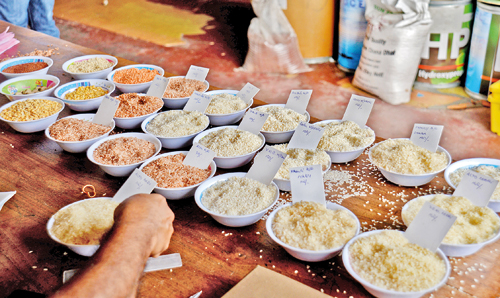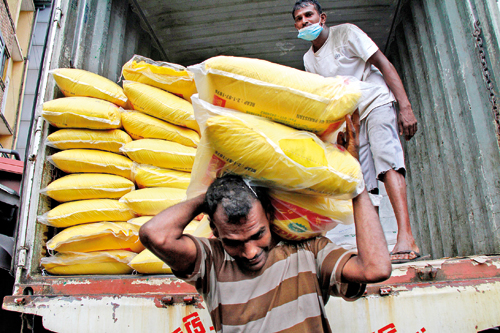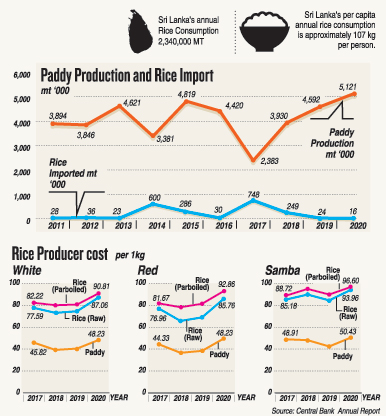News
Rice price free-for-all as controls are lifted
Rice prices increased further this week following Cabinet’s decision to revoke the gazette setting a retail price cap on the staple food item.
Wholesale merchants and retailers, one example being large-scale miller Dudley Sirisena, began setting their own prices following the cabinet decision on Tuesday.

Rice prices rise amidst scarcity fears, and traders get to call the shots (Pix by Eshan Fernando and Indika Handuwala)
According to Mr. Sirisena the prices of rice varieties such as nadu, samba and keeri samba would be Rs. 115, Rs. 140 and Rs. 165 a kilo respectively.
Cooperative Services Marketing Developmentand Consumer Protection State Minister Lasantha Alagiyawanna said the prices issued by the Rice Millers Association could not be justified, and he warned the Consumer Affairs Authority (CAA) would intervene if any group acted unfairly.
A CAA official speaking anonymously said the government move had left them the authority in a difficult situation as it had begun legal action, including court cases, against millers, warehouse owners and retailers on the basis of the now-revoked price control gazette.
 Rice prices now vary from shop to shop, but all have risen. A kilo of nadu, following the millers’ price increase to Rs. 115, is now available at markets for Rs. 120-122 while samba is Rs. 145 and keeri samba Rs. 170 in shops in Colombo and its suburbs.
Rice prices now vary from shop to shop, but all have risen. A kilo of nadu, following the millers’ price increase to Rs. 115, is now available at markets for Rs. 120-122 while samba is Rs. 145 and keeri samba Rs. 170 in shops in Colombo and its suburbs.
Some shops are placing orders to purchase rice following shortages created recently by the millers’ ploy in withholding stocks in order to raise prices at will.
The owner of a supermarket in Kiribathgoda, Dasitha Walgamage said people are ready to buy rice regardless of the cost as they fear further shortages at the whim of millers.
Grocery shop owner A.K.G. Pushpakumara said he would have to increase his prices when he buys new stock at the new prices. He feared there would be more increases in future weeks.
He said he agreed with government controls on rice prices but said controls should reflect reality.
“Earlier we had to stop selling rice when the rice we bought from millers exceeded government-controlled prices,” he added.
Daily wage earners who lost months of income during lockdown are appalled at the increased cost of the food staple. K. Kamala Danawathie, a resident of Kelaniya whose husband, a labourer, had had no work, said the high prices placed them in great hardship.
 Reports from consumers indicate restaurants have reduced rice portions following the cabinet decision.
Reports from consumers indicate restaurants have reduced rice portions following the cabinet decision.
All-Island Farmers Federation (AIFF) Secretary T.B. Sarath said rice prices could keep increasing in the absence of government control.
He said leading mills have already started to purchase paddy from farmers at the attractive price of Rs. 4,000 for a 50kg bag to stock up warehouses so they could control the rice market in future months by retaining a monopoly over supply.
Farmers who are happy that they are being paid enhanced prices of
Rs. 4,000-4,200 for a bag of paddy by the big mills would rue the sales once those mills began increasing the price of milled rice, Mr. Sarath warned.
Small-scale millers are angry that the government move has given big mills control of the market.
Lanka Rice Producers Association Secretary Mudith Perera said current and former ministers in charge of trade and agriculture had mismanaged rice price control as they made political instead of reasoned, data-based decisions.
He pointed out that smaller millers had only asked for a rise in the controlled price but that the government, instead of a revision, had revoked the controlled price, allowing larger millers to sell rice according to their terms.
He said the government would be forced to allow rice imports, once again allowing the big millers to bring low-quality rice into the country.
Maradagahamula Rice Producers Association President V.K. Ranjith said the small and medium-sized mills, which produce 60 per cent of the rice requirement, are being hit hard as farmers have started to sell their paddy only to the big mills.
| Farmers reject need for imports | |
| The State Minister of Cooperative Services Marketing Development and Consumer Protection, Lasantha Alagiyawanna, said the Trade Ministry is planning to import 100,000 metric tonnes of rice. All-Island Farmers Federation (AIFF) Secretary T.B. Sarath objected to this, saying there were ample stocks available in the country and no need for imports. He said if the government exerted more control over leading mill-owners the price of rice could be controlled. |

